American Sabbatical 030: 10/10/96
Galiano Island
10/10/96.. Galiano Island.
Travelers beware: your internal clocks may need resetting. We had to catch a 10:20 ferry in British Columbia, which meant
getting on the road by 7 AM (and not getting taken apart at customs),
so I set my internal alarm for 6 o’clock. I learned when I was
fishing that I could wake on demand, but I hadn’t considered time
zones. So I came bolt upright at 3AM Pacific time, 6 at home.
Just as well, because the smell of cigarette smoke had percolated
through the motel bedding from a contaminated blanket, and both
Peggy and I were starting to wheeze. So much for “non-smoking.”
Motels are getting better, but even a careful sniff-test doesn’t
always tell all. In this case the sheets were clean and the room
OK, but the blankets were foul. Usually the secret surprise is
the cleaning agents which leave a perfumed atmosphere. Someone
should get the message across to motel managers about housekeeping
toxicity, but we seem willing as a society to ignore what our
noses are telling us.
We reinserted Festivites and groped north in the rush-hour darkness.
Low scud moving over the stars and a southeast breeze puffing.
As the day rose, a pale thin line etched the mountain horizon
to our east, and we could smell the ocean. Our noses began to
clear. After stopping in Bellingham for pancakes and caffeine,
we shuddered over the speedbumps, past the Peace Arch, and up
to customs.
Our past adventures with Canadian/American immigration and customs
make these crossings moments of anxiety, which is what petty bureaucrats
thrive on. But our profile has changed, I guess. Middle-aged eccentrics
in subcompacts just get a long quiet look. The two 30-year-old
shorthairs in the brandnew pickup alongside us were getting taken
apart, however. The petty officials gotta have their fun, but
not with us. So we made the Gulf Islands Ferry.
Ferries are magic. They have carried us across to different realms.
Staten Island. Metinicus. North Haven. Swans Island. Newfoundland.
The Magdalen Islands. And there’s a dynamic atmosphere around
ferry terminals and on the big boats, an air of industrial expectation.
Tourists and tractor-trailers, families with shopping bags and
contractors with toolkits. Mercedes and microbuses. These Canadian
magic carpets give a good name to the industrial revolution. They
retain the muscular efficiency, the clean design, and the stolid
courtesy we might have bragged on in the 1920’s. It’s hard to
sneer at our technologies when the departure horn blows.
We stood by the rail arm-in-arm and let the pacific wind tug at
our clothes. The sky was low and gray, but the mountains on the
San Juan’s and Vancouver Island defined our perimeter in black,
with touches of white on the slopes. Galiano here we come.
It had been 17 years since we last saw Kelly, and 20 since we’d
communed together in St. John’s, Newfoundland. Peggy wondered
if we’d recognize him, but when we rolled up the ramp at Sturdies
Bay there was no question who it was standing alongside an old
blue caddy wearing a wide grin. “Follow the barge,” he said, and
set off into the hills full tilt, with us in pursuit.
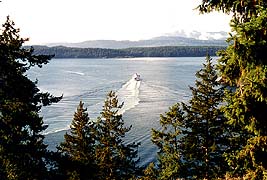
Galiano Ferry
And such luscious hills. If we’d been starved for green these
past weeks, now we were drowning in a vegetable palette. The vegetables
were pretty grand, too. Doug fir, Sitka spruce, western red cedar,
western hemlock, big leaf maple, red alder, all neckwrenching
tall, and dripping wet. By the time we pulled into Kelly’s plantation
we were starting to grow a little moldy round the edges.
Kelly is from Galiano, born and bred, but we met him when he was
co-owner of MaryJane’s, the health and exotic food emporium in
St. John’s, which was at the heart of the alternative community
there. I peddled my toys at MaryJane’s, and the whole crew potlucked,
partied, worked, made music, did yoga, and generally hung together.
Kelly was the Adonis of the tribe, one of those charismatic young
men who was as golden spirited as he was beautiful. We all loved
Kelly, which was a burden he would rather have put down. Peggy
calls him Seth’s first friend, because Kelly would babysit Seth,
and we’d come home to find them both in gales of laughter. When
we were expelled from the Dominion, Kelly was the numinous spirit
we missed the most.
Of course the 70’s idyll of a community on the rock in the sea
fell apart, like all the rest. MaryJane’s, immensely successful
economically, dissolved in rancorous litigation. People traded
partners and lost friends, and the centrifugal forces spun us
all across Canada and the US (and Africa and India). Kelly came
home to BC, and part of the band followed.
For the last 19 years Kelly has lived and built a showplace wooden
home in the tall timber on Galiano. Kelly drives the island school
bus, and those of you who live in the boonies can imagine what
a blessing it is for the local kids to have someone who’s been
there, and who still cares, picking them up in the morning. He’s
big brother to a whole generation of Islanders, and now their
children are appearing by the road. The sweetness which made you
afraid for Kelly in the 70’s, has matured into a solid goodness
and quiet competence that makes a harbor for your restlessness.
At least it does for ours.
Galiano itself is a northern jungle-in-the-sea, with all the island
problems Mainers know too well. British Columbia is Canada’s banana
belt, and all that nation’s westering ideals and nonsense washes
up there. Imagine a Canadian island with no frost, and you get
a sense of how crazy the Gulf Islands can be. Like Maine Islands,
Galiano used to be a local affair, a logger’s island, where one
outfit owned the majority of the turf and managed it for the long
term. But the pressures of outside capital, and the demand for
recreational development have torqued the old lines out of shape.
Waves of in-migrants have changed, or destroyed, the local consensus.
In the past, local families got together to create and maintain
local parks and refuges, donating the land in common and pooling
their labor. We climbed Mt. Galiano, and went to the spectacular
overlook at The Bluffs, both donated parks. And the rest of the
island was traditionally open for firewood cutting, hunting, hiking,
etc., so long as the landowning corporation held sway. But economic
forces drove the big owner to split the island into parcels, and
in-migrant protectionists tried to push them into putting it into
conservancy, at a multi-million dollar loss.
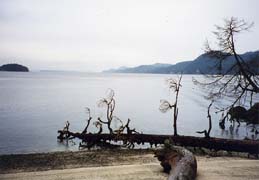
Provincial Beach
Needless to say it didn’t happen. The island was sectioned off,
sold up, and closed to public use. Then the fear of explosive
development resulted in draconian ordinances, and now there is
a building ban on the island. So the new owners planning to build
are outraged. Meanwhile the logging outfits that bought sections
are liquidating the stands for quick profits. Does this all sound
familiar?
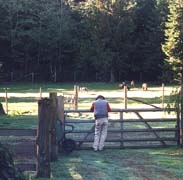
Drawing the Scene
The community feels like other maritime hinterland towns we’ve
known. Everyone into everybody’s pockets. Cruising the island
with Kelly in the barge is an exercise in back-scratching, information-sharing,
deal-making. Feels like home. But the local/stranger thing is
in a middleground between the summer hostility of some Maine coastal
towns, and the open friendliness of most of Maine’s backcountry.
There are no hostile glances, but there isn’t any curiosity, either.
Strangers are commonplace, but not a complete threat, yet. Kelly
says the majority of residents are now fromaways, with an urban
bias, and the summer population is ten times the winter.
Meanwhile the Kellys eke along. His nurturing instinct has filled a clearing in the woods with donkeys, dogs, cats, and chickens. Not to mention ravens and owls. As we drove in behind him, a huge owl buzzed us, and the ravens were cronking as they dive-bombed the hen yard. Kelly said the ravens pluck neck feathers from the chickens to mark them for killing. Like Crow Indians counting coup. The owl just takes.
So we’ve been woken at cockcrow by doodledo and the braying of
jackasses. Hilarious music which brings you to life laughing.
And the donkeys will playfully surround you, if you sit in the
field, and nibble you beard, or tug at your clothes. I’ve never
had the company of donkeys before, and I find their humor irresistible.
Peggy is completely smitten. Wonder how our neighbors would feel
in Bowdoinham...
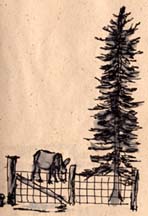
Donkey Heaven
This has been a refuge for our animal spirits, here on the far edge of our journey. I feel myself sagging into lassitude. I could happily stay here in the moist woods with the other jacks, so we better make our next move quick, or I’m a goner. If I disappear, look for me in the Gulf Islands.
(Memo #28)
Oct. 12 - Islands
Who? residents of Galiano (longtime residents + recent immigrants)
What? large island
Where? off Vancouver, British Columbia
When? lumbering-fishing for several centuries, recent development
How? ferry for goods and services and high school
Topics: islands, access/supply, transportation, services, education,
development.
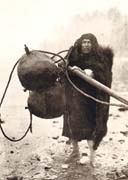
Local
(by Curtis)
Islands have a a mystique and a romance about them. They also
have a common set of problems around access/supplies and transportation.
We’ve lived on a number of islands - from megalopolis Manhattan,
to the remote Magdalen islands of Quebec, to the huge island-province
of Newfoundland. The past three days we were on Galiano, an island
in the Gulf Islands, the island group across the Straits of Georgia
from Vancouver. We took a forty-five minute ferry ride from a
point just south of Vancouver to get there.There are also water
taxis and a float plane, or helicopter for emergencies.
Galiano is over twenty miles long, two to three miles wide. Paved roads and dirt lanes provide access to almost every corner. The village has several food stores, a bakery/cafe, several art/craft stores, the ferry slip, an information booth, a pub, two restaurants, a fireman’s hall, a town office all strung along the paved road. We were amused that the Rod and Gun Club was next door to the medical clinic. There are several B & Bs, and a more ritzy small inn on the water.
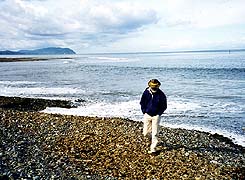
Midden Beach
Galiano has the only island provincial park in the archipelago.
It’s a beautiful chunk of land on the shore with campsites in
the groves. The First Nations (native peoples) used the island
for millennia, and left immense shell heaps, now part of the undulating
topography. The Galiano woods are northwest coast woods, huge
straight cedars and fir, with dense northern rainforest undergrowth,
especially waist-high ferns. Moss and lichens grow everywhere,
and there is always moisture on the air, and dripping leaves.
The ground is a soft base of bark and moss and leaves and needles.
Islanders seem to “go to town” (Vancouver or Victoria) on a regular
basis for goods and services not available on the island. Dentists,
taxmen, lawyers, are all in town. A friend’s oven needed a part
that might take six weeks to be be sent; it’s often easier just
to go and get something in town. There are some specialists on
the island to do plumbing and car repair, but not enough workers
to meet the demands . Apparently even basic work like lawnmowing
gets paid $15 an hour (the Canadian is worth about 2/3s the US
dollar). A veterinarian from Victoria was on the island to see
animals with problems; there is enough need so this is becoming
a regular Galiano vet clinic day. Food is expensive, and many
locals have gardens.
Galiano is near enough to both Vancouver on the northeast and
Victoria on the southwest so that it has been subject to development.
There has been pressure from both logging and real estate. Both
have had major effects on the island. Until recently the woods
on Galiano were owned by a single logging company . When it sold
out the islanders missed the chance to control their own destiny,
and the land has been parceled off, except for the provincial
park and the Galiano Mountain reserve, bought and maintained by
the islanders. Land prices have soared. I saw an ad for a small
waterfront cottage for around $200,000. Galiano has just imposed
a total building embargo. There is a lot of renovating going on,
but no one can divide property and build on spec. A common problem
of development (whether it be in Freeport or Galiano) is that
rising real estate prices and taxes make it difficult for natives
to stay.
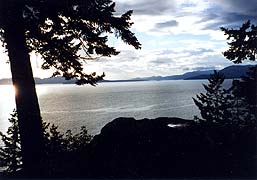
Gulf Island View
Schools are a primary service that are expensive on islands. The
elementary grades are housed in a small school on Galiano. High
schoolers must go to the huge high school that serves the whole
archipelago. The island school bus picks them up and takes them
to a wharf from which a contracted water taxi (one of two thirty-foot
speedboats, called the “Graduate” and the “Scholarship”) takes
them across to school. It returns them in the late afternoon.
Galiano students have a long day and are unable to participate
in afterschool activities and team sports because of transportation
difficulties. This school transportation is also extremely expensive.
On others islands we know, high schoolers go off to boarding school
(again expensive). A few island families are homeschooling. The
island roads are rigorous enough so school is usually called on
when it snows (which is rare).
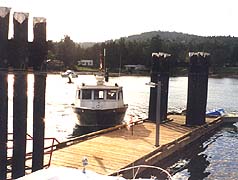
School Bus
This island still has great economic diversity. There are craftsmen
and farmers and a few fishermen. Owner-built cabins are next to
architectural wonders. The weekend and tourist population is definitely
on the rise. Development pressure will increase. Although the
woods were grander and wetter, Galiano felt much like Chebeague
or Swan’s Island. And I knew that Galiano’s problems will continue,
like those of Maine’s islands.